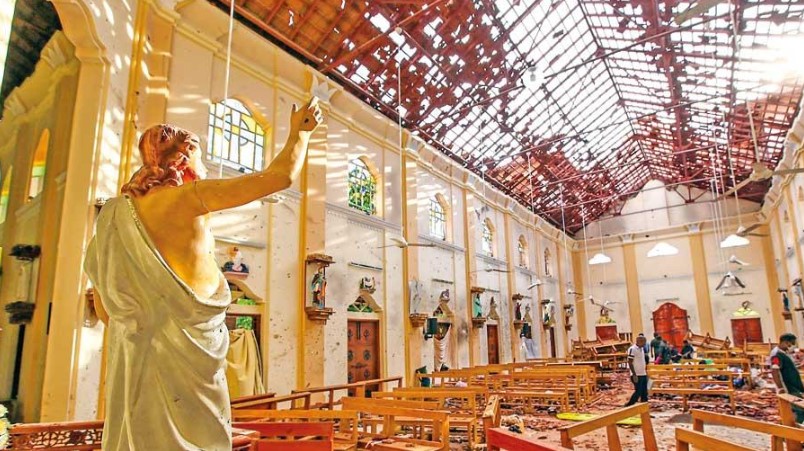January 15, 2023, Colombo (DM): “On the ill-fated day of 21st of April 2019, this island home was awoken rudely to witness one of its most tragic events in the annuls of its history, and in a series of bomb explosions that sent the nation reeling in shock and disbelief, scores of innocent worshippers at several churches, as well as citizens in several locations, were plucked away from their loved ones in the most macabre and dastardly acts of terrorism that this country has ever seen. In what has now come to be known as the Easter Sunday Attack or the Easter Sunday Tragedy in its melancholy sense, there was desolation and despair all round the country, and it may not be denied that it took a long while for this country to limp back to normalcy from the ravages of this tragedy. The trail of destruction and dislocation that the Easter Sunday Attack has left in its wake is a memory that this country will long live with, and this Court is not spared its reverberations,” the seven-member Supreme Court states in its 122-page judgement after taking into account 13 fundamental rights petitions filed by a group of petitioners, including victims and survivors whose family members faced one of the most tragic deaths in front of their own eyes.
The judgement amply displayed the serious state of affairs with regard to those people whose hands were the security of 22 million people.
The Supreme Court judgment revealed that Jayawardena, on April 4, 2019, had personally received information from a highly delicate source (via WhatsApp)
The court questions the role of Nilantha Jayawardena, the former head of the State Intelligent Service (SIS)
The Bench states that Nilantha Jayawardena cannot put forward a facile argument that the intelligence received on 04.04.2019 was nothing more than mere information.
Having endured a 26-year-long war with bombs, suicide attacks, landmines and even aerial attacks in the heart of Colombo, Sri Lanka was never used to multiple coordinated attacks where several bombs went off almost the exact moment. Though the method of the attack was new to the shocked Sri Lankans, the news of the plan to be carried out was known beforehand by the intelligence agencies and those responsible from the topmost positions.
The Chief Justice, Jayantha Jayasuriya, Buwaneka P. Aluwihare, L.T.B.Dehideniya, Murdu N.B. Fernando, S. Thurairaja, A.H.M.D issued the Supreme Court’s unanimous judgement. Nawaz and A.L. Shiran Gooneratne. The judgement amply and evidently displayed the severe state of affairs with regard to a set of people, the so called state intelligence, to whom the security and protection of 22 million people in this country had been handed over.
“We must express our shock and dismay at the deplorable want of oversight and inaction that we have seen in the conduct of affairs about Security, Law and Order and Intelligence. Glaring examples of a lack of strategic coordination, expertise and preparedness need a critical examination of the way forward. The failures that resulted in the Easter Sunday attacks and the concomitant deaths and devastations have left behind an indelible blot on the country’s security apparatus. This country, blessed by a multi-cultural and multi-religious polity cannot be left to the vagaries of these follies and made to suffer, leading to violence, fear, apprehension and uncertainty. These events must recede into oblivion, but they remind us starkly of the necessity to effect legislative, structural and administrative changes,” the bench stated while expressing shock.
“It is evident from the evidence that there is an urgent need to place the National Security Council (NSC) on a statutory footing and its composition specified with clarity so that there are no maneuvers to manipulate hostile exclusions and selective inclusions. The affidavit testimonies and the large volume of documents we have perused highlight the necessity to revamp the security systems and intelligence structures so that the expanding threats of terrorism and emerging challenges could be nipped in the bud and arrested, as this country cannot descend into anarchy once more. The course of conduct we have scrutinized demonstrates a woeful lack of expertise in intelligence gathering and dissemination among important individuals entrusted with the task. For instance, the Office of Director, SIS and CNI must be occupied by individuals with the necessary skill and expertise and the conduct of the Respondents who held the office, upon receiving sensitive intelligence, shows a lack of awareness and understanding of strategic vision,” explained the seven justices in their unanimous decision.
Promoted to Senior DIG Administration
More than three years after the most horrendous attack on the island, mainly due to carelessness and negligence of those holding the most responsible positions in the country’s security apparatus, critics have questioned whether the country’s security is sound.
The Supreme Court judgement amply displayed the sorry and pathetic state of the country’s intelligence agent services and questioned whether those holding high positions ignored vital, intelligent information due to carelessness or did it with an ulterior motive.
The court questions the role of Nilantha Jayawardena, the former head of State Intelligent Service (SIS), who was on January 2 promoted to the post of Senior DIG Administration or the second highest senior officer of the Sri Lanka Police. The Ministry of Public Security and the National Police Commission, on the recommendation of IGP Chandana Wickramaratne, made the appointment.
The Supreme Court judgement revealed that Jayawardena, on April 4, 2019, more than two weeks before the attack, had “personally received information from a highly delicate source (via WhatsApp), to the effect that the National Thawheeth Jama’ath (NTJ) leader and his associates were planning to carry out a suicide terror attack on important churches.”
“On the same day, another delicate source received similar information in writing at 12.15 hours. Nilantha Jayawardena states that he immediately instructed responsible officers to transform the above information into intelligence to establish the true identities of persons,” the Judgement states.
According to the courts, the former head of SIS seemed to have taken the most vital information- which relates to the most critical national security of a country battered for nearly three decades by the war against terrorist outfits- lightly.
“After an initial briefing on the 6th of April 2019, he wrote to the then Chief of National Intelligence (CNI) seeking instructions and had informed the then Secretary, Defence Hemasiri Fernando, on the evening of 6th April 2019. Nilantha Jayawardena does not elaborate on the exact nature of the initial briefing on 6th April 2019. Why he characterises the information he received via WhatsApp on 04.04.2019 as just an input which does not amount to intelligence is also not explained in his affidavit,” the Bench queries.
“If the provider of the vital information was believed to be a highly delicate source- as described by Nilantha Jayawardena- the reason for the Director of SIS to treat the information as a mere input and not intelligence must have been set forth and explained in the affidavit, leave alone his omission to refer to his source in his communications,” exclaimed the Bench which goes on to state “Come 4th of April 2019, it is undeniable that Nilantha Jayawardena himself was too well equipped with a large volume of material on the likely assassins to plead ignorance of their identities and in these circumstances, Nilantha Jayawardena cannot put forward a facile argument that the intelligence received on 04.04.2019 was nothing more than mere information”.
Radicalization of Zahran and his complicit partners
The detailed analysis of the Supreme Court judgement underscores that the top brass of the police and intelligence was well aware of the nefarious activities of Zahran Hashim and his network as far back as 2016.
“According to the final affidavit tendered by Nilantha Jayawardena, he had submitted several reports to Pujith Jayasundara – the IGP, during the period 20.04.2016 to 29.04.2019 relating to ISIS and Radicalization, including information about Zahran Hashim and his network. The summary of reports titled “Reports sent to IGP on ISIS & Radicalization in Sri Lanka (including Sahran’s network from 20th April 2016 to 30th April 2019” shows a total of 97 reports, while reports sent to Secretary of Defence from 1st November 2018 to 25 April 2019 number around 11,” the judgement states.
“This testimony before this Court demonstrates that Nilantha Jayawardena and Pujith Jayasundara were aware of the potential threats by Zahran, his cohorts and the NTJ long before the Easter Sunday attacks. Even the Secretary of Defence cannot plead ignorance of the radicalization of Zahran and his complicit partners as he had continued to receive reports regarding this from November 2018.
The list provided by Nilantha Jayawardena, State Intelligence Service (SIS), to the IGP on the 31st of October 2017 shows that 94 individuals had been radicalized. Another list given on 31st January 2019 contains the name of 129 persons. Three months thereafter, the Easter Sunday tragedy shook this country and sent unbearable tremors of fright and agony around the country.
Both these two lists invariably contained the names of the same persons. For instance, a person called Jameel was on top of each list, and they also had the names of Zahran, Rilwan (the brother of Zahran) and Milhan. The Indian counterpart mentioned these names in its message to Nilantha Jayawardena on the 4th of April 2019. Therefore, these likely attackers were far too notorious for being overlooked by the security brass of this country, including the IGP and the Secretary of Defence. The likes of Zahran had long been known in this country’s interlocking network of intelligence. When Nilantha Jayawardena received the message from India on the 4th of April 2019 naming the same individuals, it is fatuous of Nilantha Jayawardena to contend before this Court that it was mere information and not intelligence”.
“It has to be pointed out that in the reports sent to both the IGP and the Secretary of Defence, Nilantha Jayawardena had already identified the likely members of the imminent attack, namely Mohamed Cassim Mohamed Zaharan, Mohamed Mufaisil Mohamed Milhan and Mohamedu Cassim Mohamedu Rilwan as those who had been disseminating ISIS ideology.
It is relevant to note that though there was a reference to planned attacks on some important churches, there is nary a narration of any consequential actions Nilantha Jayawardena took regarding his strategic intelligence and analysis of the degree of the threat facing the churches. Easter Sunday was just a few weeks away when the heads-up about the imminent attack came from India. Still, officials show little alertness or perceptiveness to carry out any measures to safeguard any of the churches in the country.
The want of attention on the part of the essential players heading the security apparatus of this country is unpardonable. There is evidence before this Court that in April 2018, a full year before the Easter Sunday attacks, the Director SIS had requested the IGP in April 2018 a closure of investigations by others into Zahran, which resulted in the SIS becoming the sole investigator into Zahran. This casts upon Nilantha Jayawardena a more significant burden and responsibility.”
After lengthy hearings and analysis, the Supreme Court concludes, “this Court cannot get away with an irresistible conclusion that the churches lay vulnerable and exposed to imminent attacks. No evidence of consequential counter-measures taken to prevent the attack has been placed before this Court.”
The Supreme Court’s inquiry into the multiple fundamental rights petitions exposes the detailed information; even the exact names of murderers of the Easter Sunday mayhem were in the hands of police intelligence. Still, it raises a serious as to why they were ignored.
“Just three days after receiving the all-important initial information on the 4th of April 2019, the first person to whom the Director SIS transmitted the news was the CNI informing him of the alleged plan of attack. This was on the 7th of April 2019 when the letter carrying the logo “top secret” contained the following as its contents:
1. As per input, Sri Lanka-based Zahran Hasmi of National Towheed Jamaat and his associates are planning to carry out the suicide terror attack in Sri Lanka shortly. They are planning to target some critical churches. It is further learned that they have conducted surveillance of the Indian high commission, one of the targets of the planned attack.
2. The input indicates that the terrorists may adopt the following attack modes.
a) Suicide attack
b) Weapon attack
c) Knife attack
d) The truck attack
3. It is also learned that the following are the likely team members of the planned suicide terror attack.
a) Zahran Hashmi
b) Jal Al Quithal
c) Rilwan
d) Sajid Moulavi
e) Shahid
f) Milhan and Others
4. The input may be enquired into on priority and feedback given to us.”
Thus, there was specificity, exactitude and clarity regarding the likely attackers, modes of attack and their targets. After receiving the above, Sisira Mendis, the CNI, communicated it to the IGP Pujith Jayasundera on the 9th of April 2019 by letter.
That letter also discloses the attackers’ identities, as revealed in Nilantha Jayawardena’s document.
As is evident from the affidavit of the CNI, he is expected to have an “Intelligence Coordinating meeting” every Monday before the central “Weekly Intelligence Coordinating Conference.”
(ICM) on Tuesday. Accordingly, the CNI scheduled an Intelligence Coordinating Meeting (ICM) for the 9th of April 2019.
Nilantha Jayawardena states in his affidavit that at this ICM held on the 9th of April 2019, he was not questioned regarding the information that he had provided to the CNI by way of his letter dated 7th of April 2019, nor was he instructed to provide further reports. But the agenda of the meeting on 9.04.2019 had an item titled “Current Security/Intelligent update” at which Director, SIS had to brief the participants. The fact remains that Nilantha Jayawardena provides no evidence that at this particular Intelligence Coordinating Meeting he alerted the participants to the looming likelihood of attacks on churches,”
The agendas of the weekly Intelligence Coordinating Meetings (ICM) furnished to this Court reveal that National Security was a priority on the agendas and whilst, just one month prior to the attack in March 2019, the activities of Mohamed Cassim Mohamed Zahran had taken centre stage at ICMs, it is surprising that we hear nothing of any briefing by Nilantha Jayawardena at the meeting held on the 9th of April 2019 on an all-important and vital intelligence that he had received on the 4th of April 2019,” the Supreme Court bench express its alarm.
The bench noted “The Chief of National Intelligence (CNI) is quite emphatic that Nilantha Jayawardena did not conduct a briefing on the information he had received on the 4th April 2019.
“All this signifies a lackadaisical approach and it is clear that it does not befit the office of Director, SIS. One cannot assert that one was actively engaged in collecting and collating intelligence, whilst the activity undertaken in the end was not anything but serving as a mere conduit for passing information,”.
“Nilantha Jayawardena was not a mere cog in the wheel, but an indispensable adjunct to the wheels of counter terrorism caravan which had to move with lightning speed and dispatch. But its wheels were grinding not only unsurely but slowly. The chronology of events unmistakably points to an indifferent approach to an obvious risk lurking in the corner and it is on this plinth that the Petitioners have rested their case.”
“All this shows that there was so much information that was available before Nilantha Jayawardena betokening doom and but it cannot be said that Nilantha Jayawardena acted with alacrity and promptitude. He never sent the information of the 4th April 2019 by way of a report to his constitutionally appointed supervisor, Secretary to the Ministry of Defence. He was quite content transmitting the so-called input only to the CNI. He was given the floor to apprise the participants of the meeting on 9th April 2019 but he never chose to share the information with those present at the meeting,” the Supreme Court details the irresponsible role played by a leading intelligent head in the country.
“By maintaining an air of confidentiality over these matters which were within his knowledge, the Director, SIS committed unpardonable lapses quite unbecoming of a super sleuth who should be heading such a powerful department under the Ministry of Defence,” the Supreme Court stated.
The Supreme Court also explained the vital information that was in the hand of SIS head a day prior to the horrendous crime.
“In the final affidavit dated 15.11.2019, Nilantha Jayawardena alludes to what he classifies as the most vital, specific and reliable intelligence which was received by him on 20.04.2019 at 16.12 hours – a day prior to the day of carnage. This message, received from a source via WhatsApp gave him a telling heads-up that Zahran Hashim of NTJ and his associates had planned to carry out the attack on or before 21.04.2019 and that they had reportedly selected 8 places including a Church and a Hotel.
The source further revealed that they had conducted a dry run and caused a blast with an explosive laden motorcycle at Palamunai near Kattankudy on 16.04.2019.
On 20th April 2019, at 16.12 the foreign counterpart sent the following WhatsApp message:
“As per a reliable input, Zaharan Hasim of National Towheed Jamath of Sri Lanka and his associates have hatched a plan to carry out an Istishhad attack in Sri Lanka. It is further learnt that they have conducted a dry run and caused a blast with explosives laden Motorcycle at Palamunai near Kattankudy in Sri Lanka on 16.4.2019 as part of their plan.
The copies of WhatsApp messages have been appended to the affidavit of Director, SIS and another response goes as follows.
“It is learnt that they are likely to carry out their attack in Sri Lanka at any time on or before 21.04.2019. They have reportedly selected eight places, including a church and a hotel, where Indians inhabit in large numbers. Further details awaited”. In its judgement, the seven justices observed, “The intelligence received proved true, but the mobilization of counter-terrorism measures or its facilitation through effective dissemination of forebodings to stem the impending disaster was absent, and this clearly shows how security mechanisms in the country remained fragile and in shambles. Sri Lanka experienced its worst moment when bombs began to explode at churches and hotels, causing destruction and devastation.
The toll of destruction and decimation is a story of unspeakable grief, unbearable pain and agonizing loss of lives. Sri Lanka came to a standstill frozen in time, seeing its people and foreigners who had visited this country getting snuffed away in a bizarre tragedy.
If one were to look at the facts and circumstances about the Director, SIS, the warning signals arrived at his doorstep. Do you know if he carried out his duties in all earnest? or he infringed the fundamental rights of these Petitioners. We are compelled to observe that he undoubtedly presents the piteous story of a lonely boy on the burning deck with no one coming to his assistance”.
With such a detailed revelation in the way of the Supreme Court judgement of Sri Lanka’s security and intelligence, it is a question of whether the country has learnt a lesson. With so Supreme Court findings and recommendations to take disciplinary action against the former SIS head, on January 2, he was promoted to the second top officer in the Sri Lanka Police.







